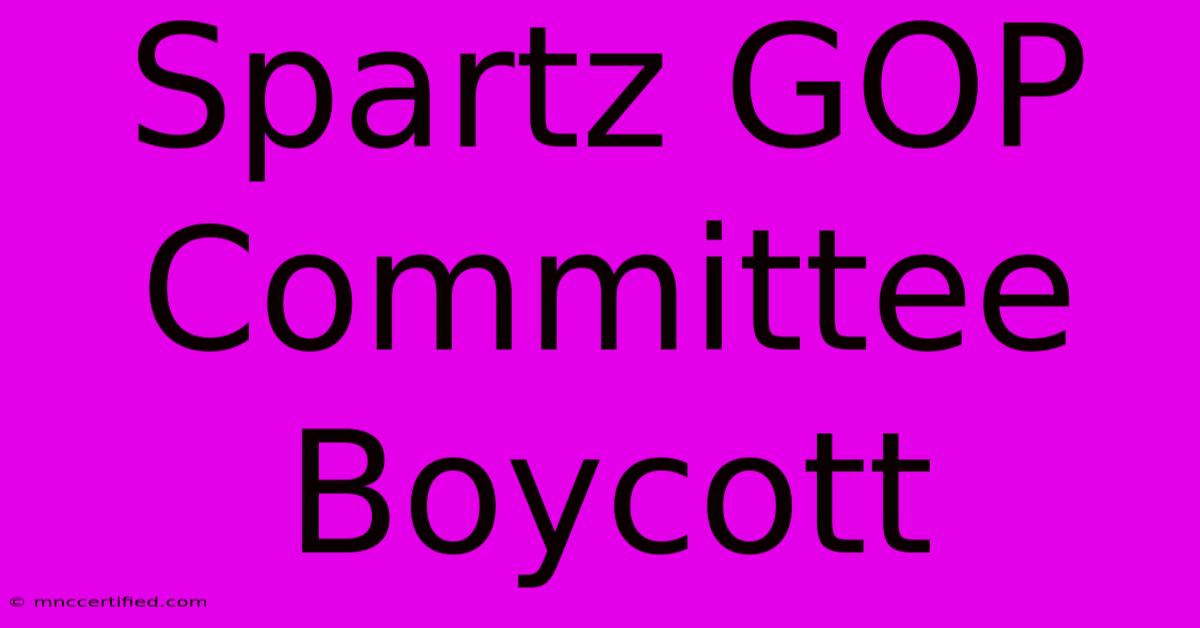Spartz GOP Committee Boycott

Table of Contents
Spartz GOP Committee Boycott: A Deep Dive into the Indiana Representative's Actions
Indiana Representative Victoria Spartz's decision to boycott House Republican committee assignments sparked significant debate and media coverage. This article delves into the reasons behind her actions, the political ramifications, and the broader implications for the Republican party.
Understanding Spartz's Boycott
Spartz, a Ukrainian-American Republican, announced her decision to boycott committee assignments in protest against what she perceived as a lack of transparency and accountability within the Republican party leadership. Her boycott is not a simple act of rebellion; it's a strategic move highlighting concerns about internal party dynamics and leadership. Key concerns cited by Spartz include:
-
Lack of transparency regarding the House Speaker election: Spartz publicly voiced concerns about the protracted and chaotic Speaker election process, arguing for greater openness and less behind-closed-doors maneuvering. This points to a larger issue within the Republican party – the struggle to unify its diverse factions and present a coherent front.
-
Concerns about party unity and effectiveness: Spartz's actions suggest a broader dissatisfaction with the direction of the Republican party and its ability to effectively govern. Her boycott can be interpreted as a call for internal reform and a more inclusive approach to decision-making.
-
Potential influence of outside forces: While not explicitly stated, some analysts speculate that Spartz’s actions might be influenced by external factors, such as pressure from specific donor groups or lobbying efforts. This aspect remains largely speculative and requires further investigation.
Political Ramifications and Analysis
Spartz's boycott carries significant political weight, both within the Republican party and beyond. Its implications include:
-
Weakening of the Republican majority: By refusing committee assignments, Spartz effectively reduces the number of active Republican representatives involved in legislative processes. This potentially weakens the party's ability to advance its legislative agenda effectively.
-
Highlighting internal divisions within the GOP: Spartz's actions serve as a stark reminder of the ongoing internal struggles and divisions within the Republican party, exposing fault lines that might hinder its ability to govern cohesively.
-
Impact on future elections: The boycott could potentially influence future elections, both at the state and national level. Voters might interpret Spartz's actions as either a sign of principled dissent or an indication of internal party dysfunction, impacting their voting choices.
-
National security implications (indirect): Spartz's background and concerns regarding Ukraine's security could indirectly impact the perception of the Republican party's stance on foreign policy. Her actions might be interpreted by some as a sign of internal conflict over the party's approach to international affairs.
Spartz's motivations: Principle or Politics?
Analyzing Spartz's actions requires careful consideration of her motivations. Is it a genuine attempt to push for internal reform within the Republican party, or is it a calculated political maneuver designed to enhance her own profile and influence? This question remains open to interpretation and further analysis.
The Broader Context: Republican Party Dynamics
Spartz's boycott is not an isolated incident. It reflects broader trends and challenges faced by the Republican party, including:
-
Factional fighting and internal divisions: The Republican party is currently grappling with internal divisions between various factions, such as the more traditional conservatives and the more populist wing.
-
Challenges in leadership and governance: The Speaker of the House election highlighted significant challenges in unifying the party and establishing effective leadership.
-
Navigating internal dissent: The party must develop strategies for managing internal dissent and finding ways to address the concerns of individual members.
Conclusion: Looking Ahead
Victoria Spartz's GOP committee boycott is more than just a personal protest; it’s a symptom of deeper issues within the Republican party. Its long-term impact remains to be seen, but it undoubtedly highlights the need for greater transparency, accountability, and internal cohesion within the party. Whether this boycott serves as a catalyst for meaningful reform or simply exacerbates existing divisions remains a crucial question for the future of the Republican party. Further analysis and observation are required to fully understand the lasting effects of this significant political event.

Thank you for visiting our website wich cover about Spartz GOP Committee Boycott. We hope the information provided has been useful to you. Feel free to contact us if you have any questions or need further assistance. See you next time and dont miss to bookmark.
Featured Posts
-
Water Scarce Vanuatu Earthquake Rescue
Dec 18, 2024
-
Intercontinental Cup 2024 Madrid Vs Pachuca
Dec 18, 2024
-
Barton Faces Malicious Communications Charges
Dec 18, 2024
-
Dog Saved Host Needs Rescue From Thames
Dec 18, 2024
-
Stream Real Madrid Vs Cf Pachuca Fifa
Dec 18, 2024